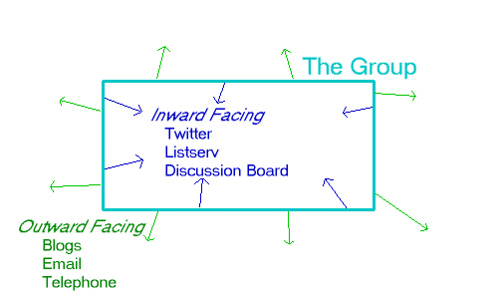The Twitter guys don't seem to know what the problem is. Some Twitter fans have become angry and organised a Twit-Out, a 24 hr boycott of Twitter. The danger for Twitter is if you start using another service, you'll stick with it. There's nothing really in the design of Twitter over Jaiku, Friendfeed, Pownce, etc that makes me use it - it's just that it's where my network is, and I can't migrate without them. But if they started to go, the infamous tipping point might be reached very quickly. The only warning I would add is that if we all migrate to another service, then that will likely have problems too. I'm not techie enough to know what Twitter's problems are (hell, if they don't know, why should I), but I'm guessing it relates to scale. They've become a success-disaster. It's likely the same fate would befall the next micro-blogging service we all jumped too - then we'd go back to Twitter which would now seem reliable.
All this might be grist for the 'stick with institutional services' mill, apart from the fact that there isn't an institutional Twitter and if there was it'd only connect me to people in my institution. Those boundaries have gone, and we need to find tools that support this. It might also be grist for the 'web 2.0 free business model has burst' mill. There may be something in this - like many people (including one suspects Twitter themselves), I find the business model of Twitter a mystery. Except I don't think these problems are related to money or capacity, ie throwing more money at it wouldn't solve it. They seem to be arising from the complexity of the number of posts and how these are handled. Maybe the solution will require more money, but my feeling is that it hasn't arisen because they lacked investment, ie it could have easily happened to a company with paying customers if they had this type of traffic.
So we'll have to wait and see. What's certain is that this won't be the first of these type of problems for web 2.0 services. This is still relatively new ground in terms of technology and more importantly, user behaviour. And with scale comes unforeseen complexity. And that's the fun of it - we get to see the new paradigms being created.



